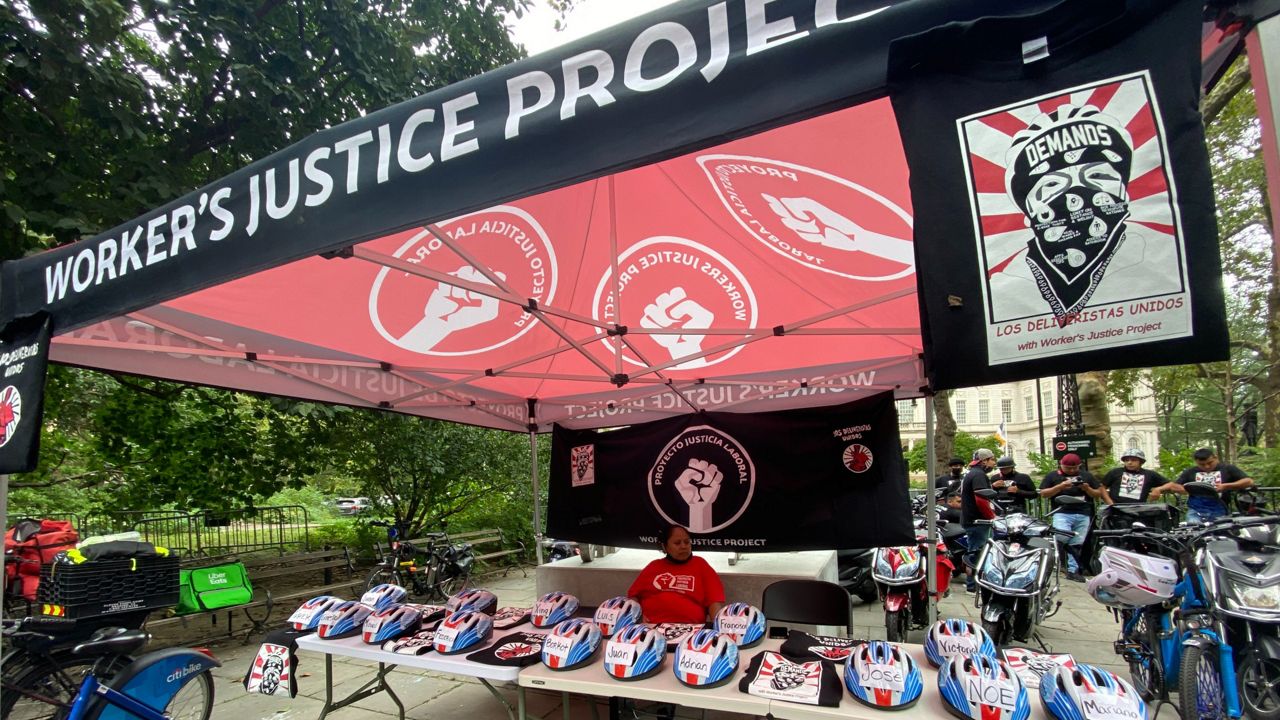The City Council on Thursday passed a series of landmark bills aimed at improving the rights of delivery workers, who during the pandemic became essential workers, helping to feed New Yorkers and keeping the restaurant industry afloat.
The six bills allow delivery workers to access restaurant bathrooms, create more transparency for tips, put limits on how far workers can be asked to travel for deliveries, set minimum payments per trip, and eliminate the practice of charging workers for insulated bags and accessing their paychecks.
“Though this battle has been hard-fought, the fact that I can say today is just a few short months after introduction is a testament to the fierce organizing power and determination of our city’s deliveristas,” said Manhattan Councilwoman Carlina Rivera, who sponsored the bill requiring restaurants to allow delivery workers to use their restrooms, at a virtual presser held prior to the vote.
The bills, which passed the council by large margins, are backed by Council Speaker Corey Johnson and Mayor Bill de Blasio, who is expected to sign them into law.
Delivery workers and advocates call the slate of bills the first-of-its-kind in the country and an important step toward improving working conditions for the roughly 65,000 food delivery workers in the city who prop up the multi-billion dollar industry for apps like DoorDash, Grubhub, and UberEats.
“Since the pandemic, these are the guys being essential workers out there when all of us were inside trying to recover from the pandemic,” said Hildalyn Colón Hernández, director of policy at the Workers Justice Project, a labor organization representing delivery workers. “They have been the ones non-stop working and making sure that all of us are fed.”
Working conditions for delivery workers have been plaguing the industry for years, according to advocates.
But the pandemic not only created a heightened demand for their services as the city shut down and restaurants moved toward takeout, but it also exacerbated many of the issues they faced such as low wages, pressure to travel far distances under tight timeframes, dangerous weather conditions and more.
“It should not have taken us a pandemic or a set of flash floods to see the basic humanity of the folks that have been delivering food to us long before this pandemic,” said Councilman Brad Lander, who sponsored the bill to create minimum pay regulations for delivery workers.
According to a study by advocacy group Workers Justice Project and Cornell University’s School of Industrial and Labor Relations, the median hourly wage for delivery workers, excluding tips, is $7.94.
Many workers report clocking in 12-hour shifts, often working seven days a week, according to advocates.
Safety concerns have also arisen during the pandemic as delivery workers face increased bike theft, harassment and discrimination, according to the Workers Justice Project study.
Taher Ahmed, who has been a delivery worker for about six years, said he’s been refused access to restaurant bathrooms many times.
“We’re delivering all day and the person that works there, he tells us, ‘Sorry [the bathroom] is only for customers,’ ” Ahmed said. “But I’m delivering your stuff so I'm basically working for you guys.”
At least one app company, Grubhub, has pledged full support of the bills.
“These bills are common sense steps to support the delivery workers who work hard every day for New York’s restaurants and residents,” according to a statement from Grubhub. “Ensuring they receive a living wage and have access to restrooms isn’t just a good idea -- it’s the right thing to do.”
According to DoorDash, delivery workers nationally earn on average over $25 per hour and work fewer than four hours a week. In Manhattan, the company states that their delivery workers earn on average $33 per hour.
The company also said it provides free or discounted bike safety gear and is rolling out an emergency assistance button later this year.
But DoorDash did express skepticism, pointing to the bill allowing workers to set geographical parameters for deliveries. They said it could lead to workers avoiding “underserved areas.”
“We recognize the unique challenges facing delivery workers in New York City and share the goal of identifying policies that will help Dashers and workers like them,” a company spokesperson said in a statement. “We will continue to work with all stakeholders, including the City Council, to identify ways to support all delivery workers in New York City without unintended consequences.”
The NYC Hospitality Alliance also voiced support for the bills.
“Today we stood in solidarity with the deliveristas as the City Council passed sweeping legislation giving them justice and protections, including the right to use bathrooms at restaurants,” the alliance said in a statement. “The restaurant industry and third-party delivery workers must continue to fight together to ensure that billion dollar third-party delivery companies can no longer exploit our city’s small businesses and workers.”
With this victory behind them, delivery workers and advocates said they’ll continue organizing to ensure dignity, safety and fairness in their work.
“This battle did not begin with legislation and it will not end with legislation, and I will continue to stand with deliveristas as long as they’ll have me,” Councilwoman Rivera said.



